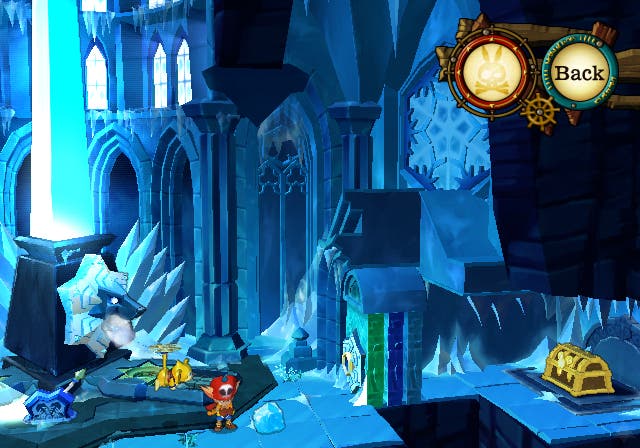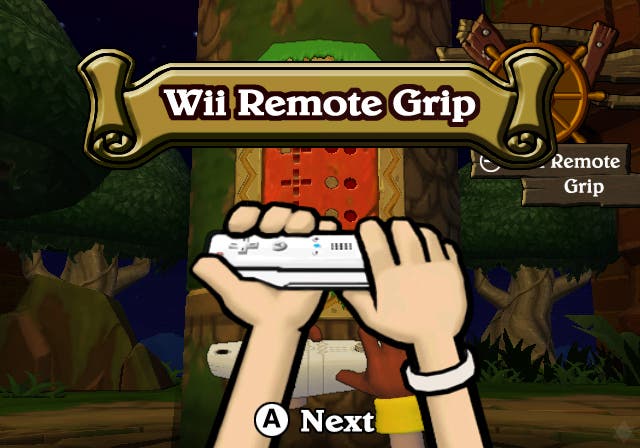Zack & Wiki: Quest for Barbaros' Treasure
Totally wikid.
The excellent thing about Zack & Wiki's puzzle design is that although it can take hours to figure a scenario out, carrying the right actions out in order once you know what you're doing rarely takes more than a minute or two. It means that dying isn't much of an inconvenience, which perhaps allows Zack & Wiki to be a little generous with its humourous death sequences. Nine times out of ten you'll die for a good reason - like misguidedly poking a monster fish with the pointy end of a broom - but occasionally it throws a collapsing bridge or unpredictable mishap into the mix, just for a bit of fun.
Only during the one-off boss battles does Zack & Wiki deviate from this winning, frustration-free formula, forcing you to repeat the whole battle again (god, remember when playing entire levels again fifty-eight times was standard?). Helpfully, though, the inconvenience of dying is further alleviated by platinum tickets, which save you running through the first minute of puzzle/boss battle again by reviving you a little before your most recent demise. There's also a just-unambiguous-enough hint system to help prevent frustration (unless it's a F***ING LIGHT PUZZLE); the fact that you have to pay for it prevents people from cheating their way through, but it's an absolute lifeline when you're genuinely stuck.

It's in the combination of the control system and the puzzle design that this game's genius lies. It's more in tune with the Wii control system than anything else except Wii Sports, and Zack & Wiki's application of the technology exceeds even Nintendo's own in breadth and imagination. Whether you're turning a key, answering a ringing telephone or rocking a baby dragon to sleep, it's always completely instinctive and weirdly exciting. The joy is in working out what to do with the various mysterious things placed around you in each puzzle - it's like being presented with a brand new playset every level, and as the scenario begins to fall into place there's a glorious sense of things coming together. It's an absolute joy to play, almost every second. There's more than fifty hours' worth of sheer delight in this fifteen-hour game.
Zack & Wiki actually goes on a lot longer than you expect it to at the start, which is a welcome surprise, and absolutely none of it is padding. Each level brings its own, very specific challenges, its own unique playset of items and contraptions to play about with. There is considerable replay value, too, in finding all the hidden Capcom-themed treasures or trying for a perfect run of previous levels for a ludicrous high-score; rarely does an adventure game offer scope for a second playthrough.

I should probably point out amongst all this praise that like all puzzle-based adventure games, Zack & Wiki requires some patience and occasional trial-and-error. If you're a Halo-addicted twitch gamer with no mind for puzzles - although as a Wii owner, you probably aren't - you'll find enjoying this genre rather hard, but frankly I've little sympathy for you. It's occasionally repetitive when you fail a scenario and run out of revive tickets, but only very occasionally - the genius puzzle design prevents tiresome re-treading for the vast majority of the time. Usually the levels are so enjoyable that you won't mind anyway; you'll enjoy basking in your own perceived intellect as you zip through puzzles that had you stumped half an hour ago, and have fun bashing, twisting, cranking and sawing things with the Wiimote one more time.
Far and away the best original IP on the Wii, Zack & Wiki is a compelling reason to own this console. Its superb puzzle design and ingenious mix of humour, cleverness and the occasional bout of trial-and-error recall the best adventure games in history, and yet its gorgeous cartoonish looks and innovative control make it refreshingly modern. And unlike most Wii games, the novelty and appeal of the control system stays beguilingly strong the entire way through.
I can even forgive it for having a light puzzle.

